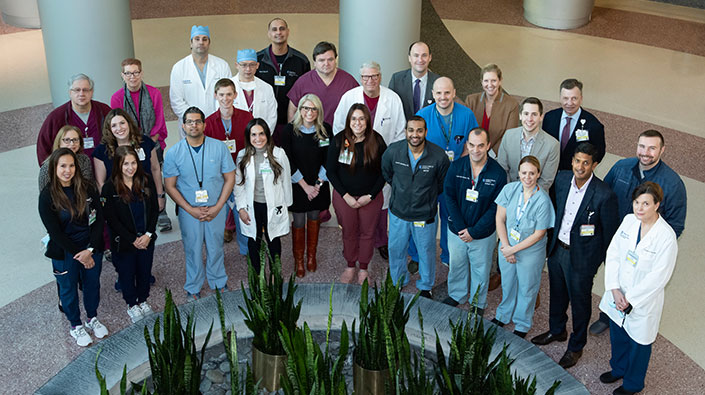Extracorporeal Membrane Oxygenation (ECMO)
The Extracorporeal Membrane Oxygenation (ECMO) Programs at Inova Schar Heart and Vascular and Inova L.J. Murphy Children’s Hospital provides life-saving support to adults, children and neonates with severe cardiac or respiratory failure.
What is ECMO?
ECMO, an advanced form of life support for critically ill patients, is a modified form of cardiopulmonary bypass that temporarily supports the lungs and heart in patients failing conventional treatments.
ECMO does not cure the underlying disease but provides time for the patient to recover, be bridged to a long-term support device, receive a transplant, or for the family and team to make decisions about their loved one’s future.
The ECMO device is connected to a patient through plastic tubes (cannula), placed in large veins and arteries in the legs, neck or chest.
It replaces the function of the patient's lungs by drawing blood from the body to a pump, which then pushes the blood through an artificial lung (oxygenator). The oxygenator adds oxygen to the blood and removes carbon dioxide. The ECMO machine then acts as the heart, sending blood back to the patient.
The ECMO program at Inova Schar Heart and Vascular supports patients with a variety of illnesses and conditions:
- Cardiac arrest, cardiogenic shock and/or myocardial infarction
- Heart failure/patients awaiting heart transplant
- Lung failure
- Blood clots in the lung/pulmonary embolus
- Pneumonia
- Influenza
- Postoperative heart surgery
- Shock from infection
- Trauma
- Heat stroke
- Poisoning
- Poor oxygenation (from newborns to adults) such as lung failure from pneumonia, cystic fibrosis, and chronic lung disease
The Inova team pioneered "awake and walking ECMO," allowing patients to be mobile when usually they are sedated under life support. This is beneficial to the patient as it results in more stable circulation, stimulation of spontaneous breathing, a larger quantity of air inhaled, and communication with the staff and family.
Potential complications with being on ECMO include:
- Blood Clots: Blood can clot within the ECMO machine, the tubes, and in the patient – resulting in a need to change out the circuit, momentarily causing a loss of support. Loss of blood flow can develop in the arms or legs, requiring procedures to improve blood flow, or in rare cases, result in the need for amputation.
- Bleeding: Patients receive blood thinners to prevent clots. The care team monitors their effects on the patient to ensure a balance between giving enough medication to prevent blood clots while not increasing the risk of bleeding at incision and insertion sites, other wounds, and other organs such as the brain. However, there is no way to eliminate this risk altogether.
- Infection: Patients on ECMO are also at high risk of developing an infection or pneumonia.
- Weakness: Patients on ECMO long term can become very weak and require prolonged, aggressive physical therapy.
- Mechanical Problems: As the ECMO circuit is a machine, mechanical problems can arise. The ECMO Specialist and Perfusion Team are available 24/7 to help monitor and assist.
Our integrated EPIC electronic medical records allow other Inova hospitals to help identify and transfer patients. Inova can also provide transport for patients from other hospitals. In addition to patients in immediate need of ECMO support, eligible patients may also include those already receiving support who need to be transferred to a larger center for transplant consideration or other reasons.
- To speak with a specialist about an ECMO referral, please call Inova's One Call 24/7 Cardiac Access line at 703-776-5905.
- To learn more about the Inova Children's Hospital ECMO program, visit inovachildrens.org/ecmo.
- To transfer a pediatric patient please call 1-877-900-9543.
